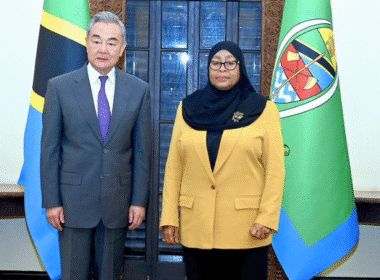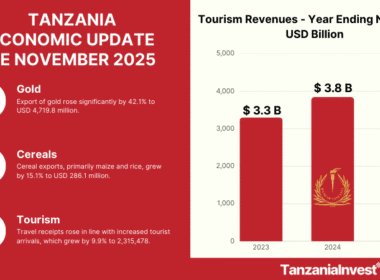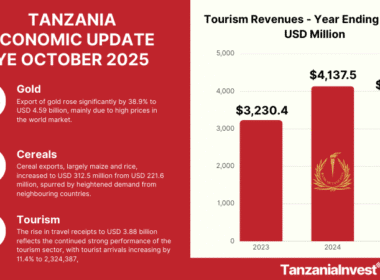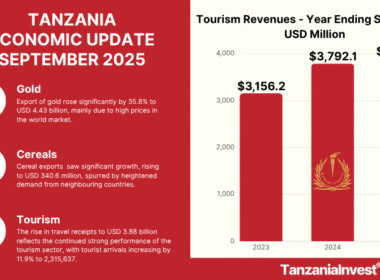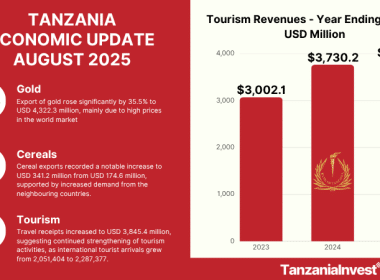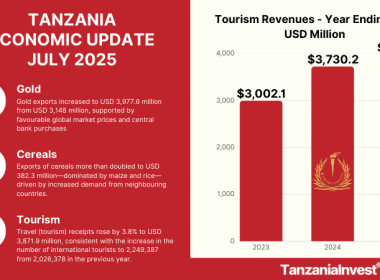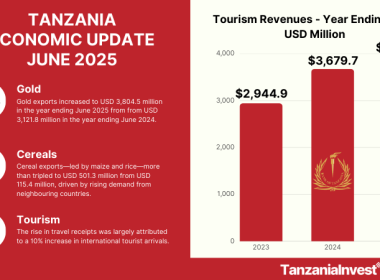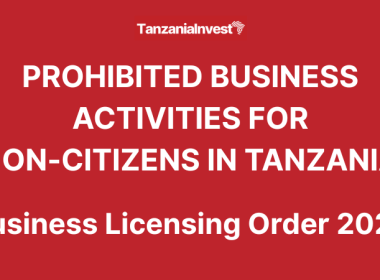Trade
Tanzania trade balance resulted in a trade deficit of USD 1.3 billion in 2019. However, the trade gap shrank by 65% over the past 5 years, from USD 3.6 billion in 2015.
During the same period, exports of goods from Tanzania rose by 9%, from USD 8.9 billion to USD 9.7 billion. Imports decreased by 12%, from USD 12.5 billion to USD 9.7 billion.
Tanzania Exports
Tanzania main exports are tourism, minerals, manufactured goods, crops, fish and fish products, and horticultural products.
Tanzania Tourism Exports
The Tanzanian tourism sector is the country’s number one foreign currency earner.
Visitor exports generated USD 2.5 billion in 2019, compared to USD 2 billion in 2015, representing an increase of 25%.
Tanzania Mineral Exports
Mineral exports of Tanzania amounted to nearly USD 2.3 billion in 2019 (24% of total exports), compared to USD 1.4 billion in 2015.
Tanzania’s gold exports accounted for USD 2.2 billion of total exports in 2019, representing more than 90% of the country’s mineral exports.
Gold exports increased by 83% over the past 5 years with USD 1.2 billion in 2015.
Tanzania exports gold mainly to South Africa, India and Switzerland. Other mineral exports of Tanzania include diamonds, tanzanite, rubies, sapphires, emerald, copper, silver and other precious stones.
Tanzania Manufactured Good Exports
Manufactured goods exports accounted for USD 985 million (10%) of the total value of Tanzania’s exports in 2019 compared to USD 1.4 billion in 2015, marking a decrease of 30%.
Tanzania’s manufactured goods exports include cotton yarn, manufactured coffee and tobacco, sisal products (yarn and twine), plastic items, textile apparels, cement, and wheat flour.
Tanzania Crop Exports
Crop exports accounted for USD 830 million (9%) of the total value of Tanzania’s exports in 2019, compared to USD 793 million in 2015, representing an increase of 5%.
Raw tobacco and cashew nuts are Tanzania’s most exported cash crops. The top export destinations of the Tanzanian tobacco are Germany, Russia, and Poland, while almost 80% of cashews are exported to India.
Tanzania Imports
Tanzania’s imports are represented mostly by transport equipment, machinery, petroleum, fertilizers, industrial raw materials, food and other consumer goods.
Petroleum imports constituted 20% of the total value of Tanzania’s imports in 2019 with USD 2.2 billion, compared to USD 3.2 billion in 2015, representing a decrease of 30%.
Tanzania imports petroleum mainly from India, the United Arab Emirates, and Switzerland.
Tanzania Trading Partners
Tanzania’s major trading partners include: China, Germany, Japan, India, the European Union, United Arab Emirates, United Kingdom, Kenya, Japan, India and South Africa.
Major commercial/trading cities in Tanzania include Dar es Salaam, Mwanza, Zanzibar, Arusha, Mbeya, Tanga, Kilimanjaro and Kigoma.
Tanzania Export and Special Economic Zones
A Special Economic Zone is a geographical area that has more liberal economic laws than the country’s typical laws.
It is an economic development tool to promote rapid economic growth by using fiscal and business incentives to attract investments and technology.
In 2002 Tanzania established its Export Processing Zones (EPZ) scheme, to provide for the establishment of export oriented investments within the designated zones with the views of creating international competitiveness for export led economic growth.
Tanzania’s EPZs promote exports of products that use local materials, such as textiles and garments, leather goods, agro-processing, and the lapidary industry.
In addition in 2006 the Special Economic Zones (SEZ) scheme was introduced, to promote quick and significant progress in economic growth, export earnings and employment creation.
SEZ also aims at attracting private investment in the form of both Foreign Direct Investments (FDI) and Domestic Direct Investment (DDI) from all productive and service sectors.
AfCFTA
On 9th September 2021, the Parliament of Tanzania has ratified the Agreement Establishing the African Continental Free Trade Area (AfCFTA), effectively joining this free market.
AfCFTA is intended to cover a market of 1.2 billion people and a gross domestic product (GDP) of USD 2.5 trillion across all 55 member states of the African Union.
Participating in AfCFTA implies that Tanzania consents to reduce, and ultimately eliminate, tariffs on 90% of products traded under the AfCFTA.







